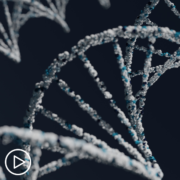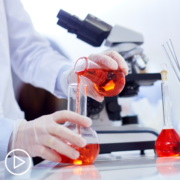Diagnosing and Treating AML: What Testing Is Essential?
Diagnosing and Treating AML: What Testing Is Essential? from Patient Empowerment Network on Vimeo.
How do test results affect the diagnosis and care of patients with acute myeloid leukemia (AML)? Dr. Farhad Ravandi-Kashani reviews essential testing for AML patients, including molecular testing and what these test results might reveal about the disease.
Dr. Farhad Ravandi-Kashani is professor of medicine and Chief of the Section of Developmental Therapeutics in the Department of Leukemia at The University of Texas MD Anderson Cancer Center in Houston, TX. Learn more about Dr. Ravandi-Kashani.
Related Resources:

|

|

|
Transcript:
Laura Beth:
Dr. Ravandi, can you define molecular testing for AML patients?
Dr. Ravandi:
We have progressed on our understanding of cancer, in general. And we have progressed in our technology, so we know that various cancers are likely caused by a number of molecular events, and this is best characterized in leukemias because we have been doing this in leukemia for many years now, simply because leukemias are much more accessible than other cancers. Leukemic cells are in blood and easily obtained and even in bone marrow, are much easier obtained than other solid tumor cancers.
And so, we’ve been able to identify a number of gene and chromosome changes that we have discovered to be prognostic, but also, have become the targets for developing effective drugs.
Laura Beth:
Beyond molecular testing, what other testing should take place following an AML diagnosis?
Dr. Ravandi:
I mean, the classical patient presents because there is something in their blood counts, so they usually have had a blood count testing done. And, of course, you need to do a number of other tests, for example, the chemistry profile, because that can show us some of the problems that can be caused by leukemia.
And the most important thing is bone marrow aspiration and biopsy, which is still, unfortunately, absolutely necessary, first to make the diagnosis, and second, to obtain the specimens for those biomarker testing that you mentioned.
Laura Beth:
If a patient relapses, does all of this testing need to be repeated?
Dr. Ravandi:
Unfortunately, yes. And so, when you said all of these testing, actually, again, compared to some other cancers, this is limited testing. Taking blood for the blood tests, and even doing a bone marrow is generally much easier than taking tissue in a colonoscopy for a colon cancer, or doing a biopsy, a lung biopsy in lung cancer, etc.
But yes, they all need to be tested, and actually, we do like to repeat the genetic testing because leukemias are dynamic, and after initial therapy, they may change in ways. They may develop new targets or new molecular changes that may be potentially amenable to new targeted therapies.
Laura Beth:
And is it common for a mutation to appear at a relapse?
Dr. Ravandi:
It is, yes. I mean, I would say it’s – I wouldn’t say it’s common, but it is frequent.



